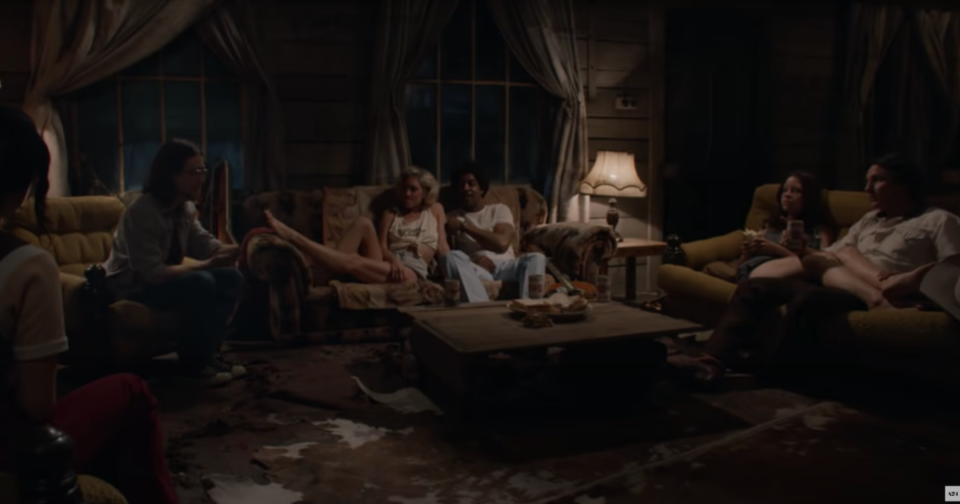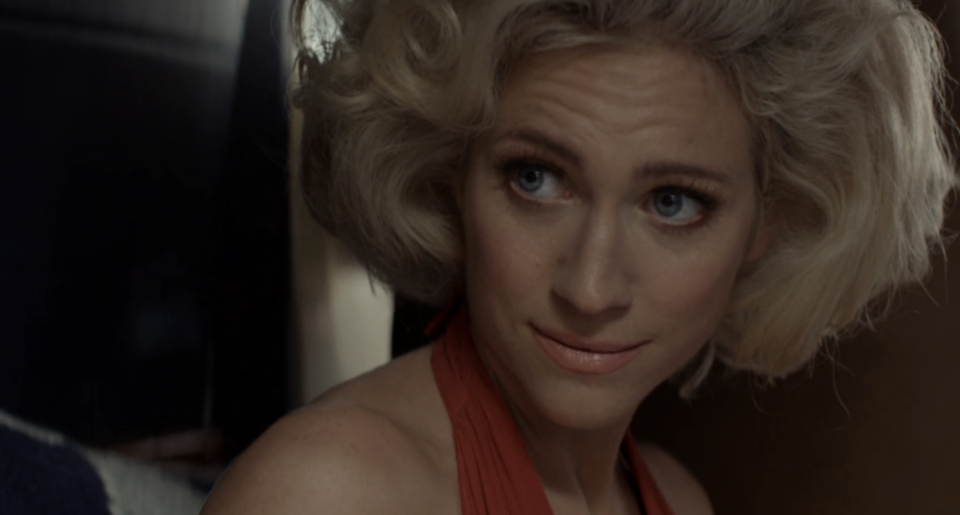It’s All Disco: Bobby-Lynne, Pearl, and Queer Representation in ‘X’

It’s no secret that we are sorely lacking LGBTQ+ representation in horror. For a long time, queer fans of the genre have had to settle for abstract themes, token characters, and subtext to tell our stories on the big screen. The community has been quick to embrace these allegorical tales about sexuality. We even claim certain iconic characters based on little more than vibes such as The Babadook, or more hilariously, the phone from Skinamarink. So why have we been sleeping on the sex-positive and metaphorically queer masterpiece that is Ti West’s film, X?
Though the movie goes back to the days of the 1970s grindhouse slasher, it has done away with some of the worst, slut-shaming tropes that were present in stories of the day. The plot sees a group of adult filmmakers renting out a farmhouse where they plan to shoot the first high-quality porno. The elderly couple that owns the farm kills them off one by one to satisfy the wife’s urges now that her husband’s heart is too weak to give her the physical attention she craves. From the perspectives of both the killers and victims, sex is portrayed largely as a good thing—something we don’t see often in the genre.
Also Read: Some Horror Movies Don’t Belong in the Summer

In a movie that equates the thrill of murder to sexual gratification, a lot of questions are opened up about our main killer Pearl’s preferences. We know she doesn’t like blondes, but she seems rather indiscriminate when it comes to gender. In fact, she actually claims the star of the film, Maxine, is the one she wants out of the group. Since the last victim held captive in the basement was a man, this presents Pearl as bisexual—metaphorically, if not strictly in practice.
We see her portrayed in X as someone who wants a thrill from individuals that catch her eye, and we know she can get that feeling from both men and women. This is rather analogous to the experience of bisexuality, which is defined as being attracted to two or more genders. It’s an experience that I don’t see tackled often in media, especially horror media where the token gay characters often go out of their way to express their sexuality. What fascinated me even more than the bisexual metaphor presented in Pearl’s character, was the strong impression that our stripper-turned-porn star Bobby-Lynne Parker is pansexual.
Also Read: The Brief and Troubled History of Universal Monster Reboots
A lot of people consider the differences between bi and pan to be semantic, especially as there is so much overlap. While bisexuals are attracted to two or more genders, pansexuals (such as myself) experience attraction to anyone completely outside of their relationship to gender. Perhaps it’s a stretch to call Bobby-Lynne canonically pansexual in a film that shows us experiences, rather than bogging itself down with labels. What I can claim with confidence is that I was drawn to her immediately because I had never seen my relationship with my own sexual identity summed up in a horror film so succinctly:
“Everybody likes sex. It’s a gas. We’re just not afraid to admit it. Queer, straight, Black, white—it’s all disco.”

Cutting through the Southern slang and expressions of the time, this quote shares a lot with us about Bobby-Lynne as a character. She’s honest, confident, and above all, accepting. Her sexuality is an integral part of her that she never tries to hide, but she also never tries to label it, either. Even though the term “pansexual” defines a very specific subsection of the queer community, that we struggle with such boxes seems to be a commonality with those of us who identify as pan. It’s more about the feelings and experiences than it is about categorization. In this way, I saw a lot of myself portrayed in Bobby-Lynne, regardless of how she would self-identify with all the terminology available to us in the year 2023.
Also Read: The Changing Face of Death in the ‘Amnesia’ Series
She has another quote later on that pinpoints perfectly the most deep-rooted source of fear in the movie. While it resonated because it came from her in particular, it also touched on one of the biggest themes of the story as a whole.
“One day, we’re gonna be too old to fuck. And life’s too short if you ask me.”
This is the heart of emotion in X. The things we want aren’t going to last forever. Whether it’s fame, experience, or pleasure that you’re seeking, life is just too damn short. Bobby-Lynne dies young and pretty, but a major point of the movie is Pearl feeling like she’s outlived her desirability. What happens to us when we’ve gotten to an age where we can no longer chase the things we desire? One of the worst fates imaginable is living only feel trapped with your regrets.
Also Read: ‘X’: Stephen King Shares His Opinion On Ti West’s New Horror Film
This is something that is manifested in the characters differently, but it’s something they all have in common. Maxine plans to escape this curse by becoming famous and being immortalized in the pictures. Church-going Lorraine, encouraged by Bobby-Lynne, plans to take the opportunity to get on screen with the others so she can break out of her shell. Pearl, who already feels her best days are behind her, turns to her more violent desires in an attempt to ease that fear of having missed out.

It’s Bobby-Lynne who goes to her grave with the fewest regrets. She never gets her American dream house with a pool to sun what the good lord gave her, but she does live every day honestly. She knows who she is and what she wants. Even her on-again-off-again relationship with her male co-star, Jackson, is not a connection that she seems dissatisfied with. There is a lot to be said about taking what you want from life experiences, rather than trying to fit into someone else’s idea of what you should be. Where a traditional horror movie would paint her as the dumb blonde or the whore archetype, X gives us someone who is charming, considerate, and open-minded. Bobby-Lynne Parker is, to me at least, a pansexual icon.
Also Read: The Stephen King Trifecta of 1983: ‘Cujo’, ‘The Dead Zone’, and ‘Christine’
There is also a lot of comfort in Pearl’s narrative, even though the audience is set up to root against her. One thing West accomplishes excellently in this film is to give us a sympathetic villain. You don’t have to condone Pearl’s murders to feel the catharsis that she experiences from their execution. While she may not be the character to get all our life lessons from, she does set a good example in some ways. She found a partner who understands and embraces the parts of her that can’t be satisfied within the heteronormative confines of traditional marriage.
Then, she takes matters into her own hands when she begins to feel neglected by her husband. She teaches us that it’s never too late to reconnect to a part of ourselves if it’s a part that we still long for. In that way, I’d argue that Pearl is also a queer horror icon.
It is not often I find a horror movie that so deeply expresses nuances of sexual identity in such a casual way. That X is able to present different facets of my lived experience of sex-positivity outside of gender confines through both its killers and victims without ever preaching, is nothing short of a miracle in my eyes.
Also Read: ‘Death Becomes Her’: Why Updating the Screwball Comedy Excludes the Men
It is still so important to tell queer stories in no uncertain terms. We need more horror movies where these topics and labels are discussed and featured front and center because representation is vital. Audiences need characters that show them they’re not alone. However, it is films like X that will tide us over, films that can be interpreted and identified on an individual level. We relish in films that are messy and emotional, where sexuality and morality are ill-defined themes to make of what you will. I hope we see more of its kind alongside films that are more blatant in their approach to queer storytelling.
Categorized: Editorials
